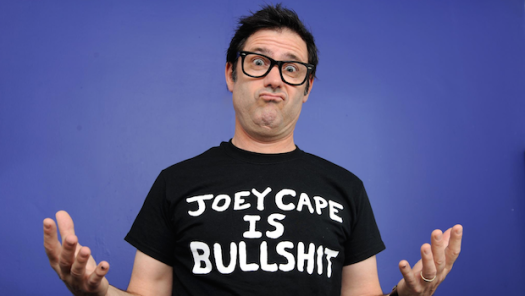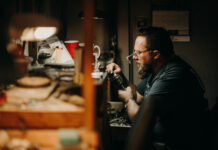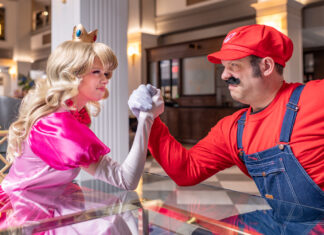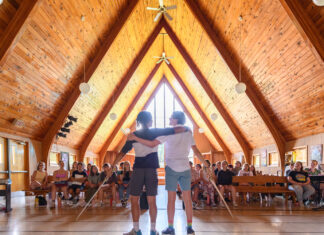By Austin Kaus
In the world of skate punk, Joey Cape might be considered royalty. His band Lagwagon has released eight full-length albums since their inception in 1990. He’s also part of the all-star punk rock cover band Me First and the Gimme Gimmes, and Bad Astronaut, Scorpios, Liverbirds, and Joey Cape’s Bad Loud. When the punk rock touring ends, the solo acoustic music seems to flow.
To mark the release of his third full-length acoustic album Stitch Puppy, Cape talked with me about the singer/songwriter’s world of family, fans and decreased whiskey consumption.
Tell me about the “Joey Cape is Bullshit” shirt.
Joey Cape: Well, I have this friend named Erin Burkett. She runs the label that I’ve been on for 25 years, Fat Wreck Chords. We hang out a lot and she used to say this to me randomly. If I was speaking about anything, she’d just say, “You’re bullshit.” It was sort of our joke, you know? I would say, “I am bullshit.” And so I kind of made this shirt in honor of her just for fun. And then I realized, “Imma make some more of those.” (laughs)
Is she the mom of the group that keeps egos in check?
JC: Exactly.
You’re talking about aging not only in the music, but even in the press release. It directly deals with aging. I’m curious what it’s like for you to process aging as a musician.
JC: I don’t know. I mean, there’s a lot to say about that. I could write a novel about it, almost. I think mainly things get better with age. That’s true. [I have a] better understanding of what I do now and a better ability to enjoy it.
What do you know now that you wish Joey from 25 years ago knew?
JC: Well, I definitely know how to do this better, more efficiently. Touring and making records and kind of getting to a place with music that I’m happy. Other people around me are happy. That’s the main thing. That might just be growing more patient as you get older as well. But it’s also a matter of experience, like anything else. You know what the curveballs are. You know where they’re going.
And which ones to worry about and which ones to not care about?
JC: Yeah, exactly. It’s not complicated. It’s like any other job. I mean, you just get better at it the more you do. Or, at least, you have a better understanding of it. I really enjoy it, still. And part of that is that it’s not monotonous.
Was that a worry for a while?
JC: Well, sometimes anything you do can be tedious after a while. But I don’t know that I was ever really worried about it. The only worries I’ve ever had about what I do can be worries that have to do with age, too. But they’re more a matter of, ‘Am I gonna be capable of doing these things?’
I saw an interview of you talking about putting out as much music as you can while the muse is there. What’s that pressure like?
JC: I look at a lot of artists that I grew up on and I feel like…they can just sort of lose their muse, you know? Maybe they change. I just can’t figure it out. But there are just, more often than not, people that were incredible [that] become kind of boring and don’t seem inspired or passionate about it anymore. So that’s why I’ve said that. I always feel like that’s something that might be around the corner, and you might not be able to control it. However, I think as I get older, I think you can control that.
How so?
JC: I think you just have to keep writing about your most personal things. You write about things that actually affect you and don’t be afraid to omit your feelings. You know? I don’t know if it’s going to ring true for other people, but as long as you’re writing on conviction and integrity about things that matter to you, I think it comes across.
In a lot of your solo work and Lagwagon’s 2014 album, Hang. You clearly address you’re worried about the future that your daughter’s gonna have. How do you take what you’ve talked about and deal with the state of the world? How do you maintain hope and how do you process that?
JC: Well, I think that it’s important to focus on what’s in front of you and the moment, rather than the future. As you get older, you can sort of clearly see where we’re headed because you’ve seen things repeating and you see people’s memories getting shorter. I can comment on that all day long. But you do have the ability to focus on the moments in your life that are happening now. And that may sound kinda cheesy, but it’s true. I try to keep focused on what’s happening with my daughter and my family and my friends and have a good time. That’s not necessarily saying that I’m not still aware of the things that I see around me that are disturbing. But, there might be a little bit of lost hope there. It’s just, directing hope somewhere else or looking for it elsewhere in places where it’s possibly guaranteed.
Where do you direct your hope when things feel a little dire?
JC: I direct it towards the immediate things in my life. The people that care about me and treat me well and the things that I care about that I can control. I focus on those things. It makes me feel pretty good about the world. It’s just a matter of, ‘Well, I’m here now. And I don’t believe in the hereafter,’ right? I’m not religious. I’m not spiritual. So I’m gonna enjoy my life while it lasts and try to make my daughter’s life the best life it can be. I think just teach her to be kind and courteous and have empathy and sympathy and compassion for others and enjoy herself.
How do you feel when people ask you about song meanings?
JC: It’s interesting, because most of the time people ask you about the meaning of a song, and they already have an idea. They have a preconceived notion of what they interpreted. As they should, because if you’re gonna write songs, you should expect them to be interpreted by people all around. But they are sort of married to the idea that they have in their head. It’s not a big deal. If I can remember what I was thinking at the time, I tell them. Because sometimes I have an idea, but I’m not in that moment when I actually wrote the words. The lyrics are usually generated by some pain and you don’t wanna just keep reliving it. I think that sometimes the songs are about something that was brutal enough that in a sense, you do [relive it] for a while. If I can, I’ll tell them [the meaning].
I have corrected people, but I don’t do that all that often, because I do think that it’s okay for people to interpret things. I certainly have. I know there’s times in my life where there’s songs that I love so much and I’m certain that the lyrics were this thing that I believe they are that’s amazing and then I read an article or something and I hear what the lyrics are actually about and it’s a bit of a disappointment. Because it seems like the thing I had was so much better. (laughs) So, I kind of understand that, too.
I know you talk about brutal stuff. You’ve had some loss that you’ve had to experience and you write about it both with Derrick (Plourde, original Lagwagon/Bad Astronaut drummer who committed suicide in 2005) and with Tony (Sly, No Use For A Name singer/guitarist who died in his sleep of undisclosed causes in 2012). Is it weird when fans come up to you and talk to you about their loss with those people?
JC: Shit, no, that’s not weird at all. It happens all the time ‘cause I’ve written so much about a lot of people that I’ve lost and I’ve written a lot about loyalty. I think (if people) identify with things you write, it’s always a good thing. So I’m never offended by that. A lot of the time, there’s some validation in it. It’s nice to know that other people have the same experiences. It’s obviously sad that they have experienced the same things, but it’s definitely not troublesome. It’s not offensive or anything in any way.
What’s it like to look back and look at the history of Fat Wreck?
JC: It’s really good. I’m very proud of it, you know? To have been involved in something that lasted that long, I’m honestly very fortunate. I’ve been on the same label my entire life and that’s been for more than half of my life. You can’t beat it. They’re just really good people and I saw Fat Mike in a recent interview – he talked about how Propagandhi, I think it was the How to Clean Everything album – really forced NOFX to step up their game while they were recording Punk in Drublic.
Were there certain artists or albums, either Fat Wreck or not, that put the same inspiration in you?
JC: Many. I can’t think of a specific one offhand. But I think every time you hear a band pushing the envelope a little bit in one way or another, it’s inspiring. We were always kind of on our own path in many ways. I mean, certainly, you hear something and you go, ‘Wow, it’s amazing.’ But it wasn’t always about similar music for me. It was more about songwriting. Those kind of moments for me were about hearing a band that sounded nothing like us, but it was more about hearing a lyric or hearing a melody or some sort of song that I thought was just incredible. That happens so often.
It’s not even really a threatening thing, though. I don’t think it’s a matter of me saying, ‘I really gotta up my game.’ Just seeing other people that are clearly inspired enough to make something that you think is beautiful makes you wanna keep doing it, because you love that thing and you wanna do the same thing as well. You want to accomplish capturing your emotions and feelings in a song in such a way that it’ll have that affect on people. Or at least you’ll feel good about it, you know? Like you did your work properly.
Is there a time when you’ve been writing and you’re like, ‘This is too emotional. This is too much?’
JC: Yeah, there’s been a few times where I went ahead with it. In the last ten or twelve years, I think that’s happened to me a number of times. I just kind of have a role. If I write it, it’s gonna have to go down. (laughs) You know, I just never really worried about. I probably should have, but I didn’t worry about the effect it would have. It’s more a matter of just getting closer to the truth. And if it happens to be brutal, that’s the game, you know? Sometimes, I worry a little bit about if I write about someone in particular, they might know that I’m writing about them. And so I think twice about the specific nature of the lyrics. But if I feel they’re true, I just go through with it. And every once in a while, somebody knows.
Is that weird when it happens?
JC: It’s only been weird once, because I think most of the time, people figure it out. It’s sort of left unspoken, but you know they know. But I did have one close friend that called me out on it, and she was angry. Really angry.
What song was it?
JC: It was a song called ‘Burn.’ It was on the Blaze record. We’re still very close friends, you know, so it’s okay. I just said to her, “Well, it’s how I was feeling.” It’s not like I used her name, you know?
I know you’ve got some pretty devoted fans at this point. I saw you guys in Minneapolis and a guy jumped up on stage as soon as the set was over to take a picture with you. I’m curious what that’s like.
JC: Yeah, that happens all the time. I mean, it’s pretty small places. There might be some etiquette or something that you expect people to have. I don’t expect people to have that. Because they don’t do this. They don’t tour. They don’t know. They just think, you know, they’re at a party and they’re drinkin’ and havin’ a good time. It can be annoying. I have been annoyed by that before. But generally, if I’m in an okay mood, I understand. People just do that.
Well, you took it like a champ. I drank a lot of Jameson, so I appreciate your patience on it.
JC: (laughs)
You kinda seem to have an alter-ego in Randal. Like, ‘Randal Gets Drunk.’ Do you feel like you have this alter-ego that comes out on certain songs or Lagwagon sets. How does that work?
(Writer’s note: I later learned that Randal is his first name. – AK)
JC: It was just a thing my band used to say about me when I had a whole bottle of whiskey and chaos ensued. It was all in fun. I haven’t done that in many, many years. (laughs)
If you could cover one song in the future with Me First and the Gimme Gimmes, what would it be?
JC: There’s many. There are a lot that didn’t happen on different albums. I can think of so many. [When we] made the country record, there were a lot of really proper country [songs] that I think we could have done that would have been great in lieu of a few of the sort-of cheesy ones that we did. I didn’t like the cheese. People liked the cheese [and] I think all the songs that we did so good were so good on that record. But I can imagine the Steve Earle song ‘Valentine’s Day‘ as the great punk-rock song.
One of the things that’s great about (the band) is that you can do – what do they call them? Guilty pleasures. ‘Shameful,’ blah blah blah. It was a matter of how they were done. Doing ’em punk rock, it didn’t matter that Barry Manilow wrote the lyrics. I mean, it was really cheesy. But it was about tonality and song. The punk, kind of, is almost like a translator for somebody to hear this. ‘Hey, like, we think this is a great song. Let’s see what you think, now that we’ve made it, you know, palatable to you.’
I Write the Songs by Me First and the Gimme Gimmes
Have Another Ball by Me First and the Gimme Gimmes
We’re based in South Dakota. It’s been a few years since you’ve been here. Just curious if you had any specific fun or crazy memories of playin’ in South Dakota.
JC: God. I actually barely remember playing in South Dakota.
I think the last time that I know you guys played I think was in the late ’90s. And I remember because: A) It was my first Lagwagon show, and B) you guys played in what it looked like a huge barn. It had a rural backdrop painted on it and it was such a bizarre place to see you guys.
JC: Oh, I kinda vaguely remember that. I mean, it’s funny. I generally remember the first times that we played there. The first time. I guess South Dakota might be one of those states that we just don’t get to often enough. That bothers me. That’s part of the reason that I do the acoustic thing. I can go to a lot of places that we don’t go all the time with the band. There is some point with what musicians or bands refer to as ‘cow towns,’ which we like – we all like, we all love. Then, the list gets really short. It’s kinda like, ‘Oh, these are the ones we trust,’ and that has to do with agents and safety or whatever for the tour.
If you do an acoustic tour, you can kinda just go anywhere you want, and it’s great. And the early days in a band are always like that, too. You just go wherever you can go wherever anybody’ll have you. At some point or another, it’s a little more calculated. In some ways, I just kind of go, ‘Okay, where are we goin’? All right. I’ll go.’ But when I do the acoustic tours, I’m much more involved in that. Every once in a while, they make me go places I don’t wanna go. (laughs)
Is South Dakota on that list?
JC: Oh, absolutely not. I love goin’ to Minneapolis. I like St. Paul, too. That’s the part of the country that I love to go to.
For more on Joey Cape, head here. If you think he should stop in South Dakota next time, drop him a line on Twitter or Facebook.
Related:
Quiet Kids Get Loud: Why the Kickback’s “Sorry All Over the Place” Needs to Meet Your Ears




















